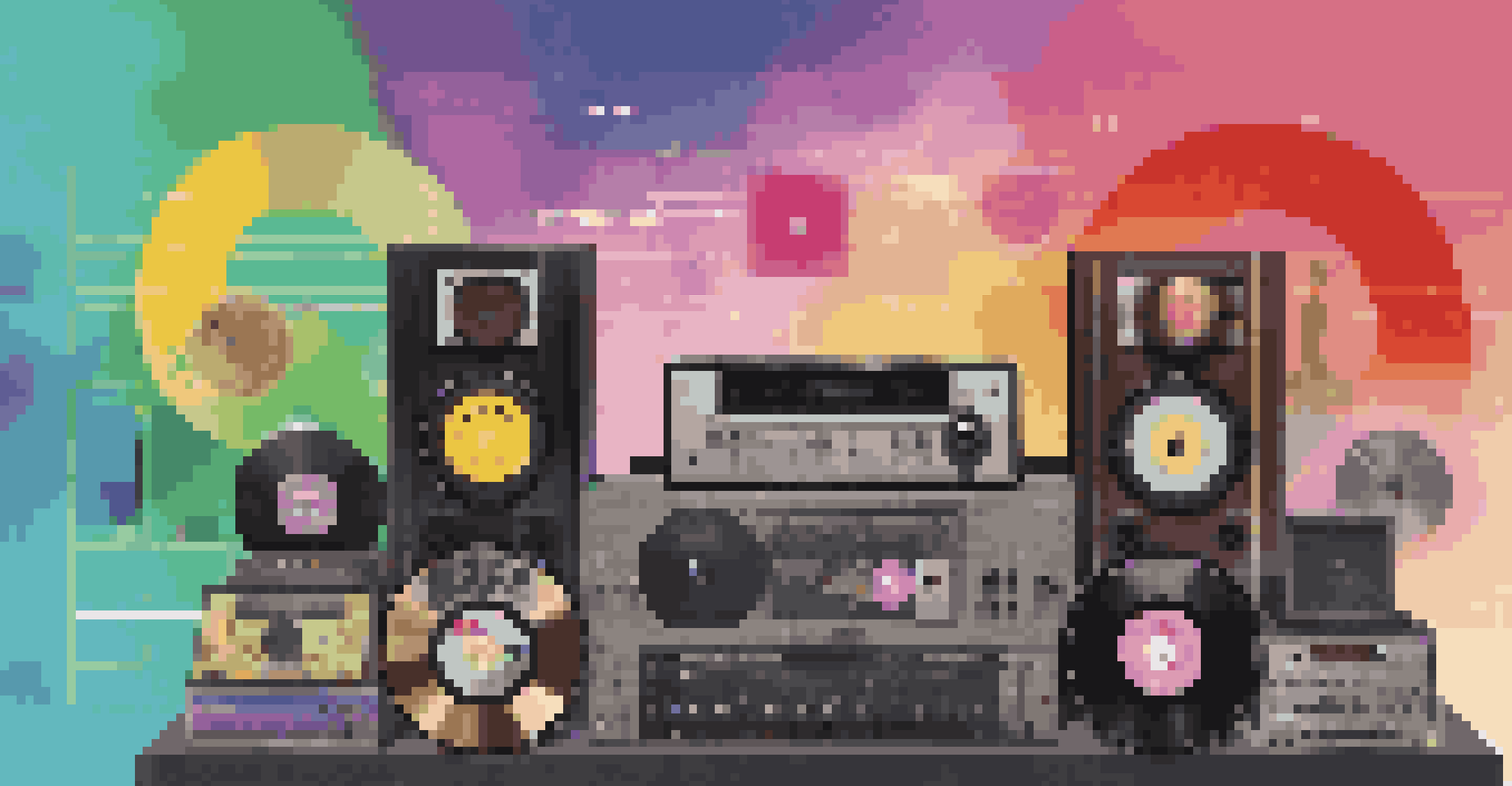Globalization and the Future of Music Distribution Platforms

Understanding Globalization's Impact on Music
Globalization has transformed how music is created, shared, and consumed across the world. With the rise of the internet, artists from diverse backgrounds can reach audiences far beyond their geographical limits. This shift has led to an explosion of cross-cultural collaborations, enriching the music landscape with new sounds and styles.
Music is the universal language of mankind.
Take K-pop, for example. Originating in South Korea, it's now a global phenomenon, with fans from all corners of the planet. This genre's success showcases how globalization allows music to transcend borders, creating a vibrant, interconnected community of fans and artists alike.
As the world becomes more connected, the traditional barriers in the music industry are eroding. This evolution raises exciting questions about how artists will navigate this new landscape and leverage globalization to their advantage.
The Role of Streaming Services in Music Distribution
Streaming platforms like Spotify, Apple Music, and Tidal have revolutionized music distribution. They provide artists with the ability to share their music instantly with millions, eliminating the need for traditional record labels. This democratization of music access has empowered independent artists to build their careers without relying on corporate intermediaries.

However, this shift also brings challenges. While artists can reach wider audiences, they often struggle to receive fair compensation for their work. The streaming model, which favors quantity over quality, raises concerns about sustainability for musicians trying to make a living.
Globalization Transforms Music
Globalization has enabled artists to reach wider audiences and collaborate across cultures, enriching the music landscape.
Despite these challenges, streaming services continue to evolve, offering new features like curated playlists and algorithm-driven recommendations to enhance user experience. This adaptability is crucial as the industry navigates the complexities of globalization and changing consumer habits.
Cultural Exchange Through Music Platforms
Music distribution platforms facilitate cultural exchange by introducing listeners to global sounds they might not encounter otherwise. For instance, platforms often promote world music playlists, which encourage exploration beyond familiar genres. This exposure can lead to a greater appreciation of diverse musical traditions.
The future of music is in the hands of the artists.
Consider how the rise of Afrobeat has taken the world by storm, blending African rhythms with elements of jazz, funk, and hip-hop. This genre's popularity illustrates how globalization allows for the fusion of diverse musical influences, creating unique sounds that resonate across cultures.
Ultimately, these platforms serve as cultural bridges, fostering understanding and appreciation among different communities. They showcase the richness of global music while allowing artists to tell their stories in a way that resonates with a broader audience.
The Future of Music Distribution Technologies
As technology continues to advance, the future of music distribution looks promising yet uncertain. Innovations such as blockchain technology and artificial intelligence (AI) are beginning to reshape how music is distributed and monetized. For instance, blockchain could provide more transparent royalty payments, ensuring artists receive fair compensation.
AI is also playing a role in music creation and distribution, with algorithms capable of analyzing listener preferences to suggest tracks. This technology can help artists reach their target audience more effectively, but it also raises questions about the authenticity of music and the role of human creativity.
Streaming Rewrites Music Access
Streaming services have democratized music distribution, allowing independent artists to share their work while raising concerns about fair compensation.
As we look ahead, the challenge will be to strike a balance between embracing new technologies and preserving the unique artistry that makes music so special. The industry's evolution will be shaped by how artists, platforms, and consumers adapt to these changes.
Challenges of Global Music Distribution
While globalization has opened doors for music, it has also introduced challenges that artists must navigate. Issues such as copyright infringement, cultural appropriation, and the digital divide are pressing concerns in the industry. Artists often find themselves grappling with how to protect their intellectual property while sharing their work with a global audience.
Additionally, cultural appropriation can lead to tensions between artists from different backgrounds. When one culture's music is adopted without proper understanding or respect, it can result in backlash and accusations of exploitation. This highlights the need for sensitivity and awareness in a global music landscape.
The digital divide further complicates matters, as artists in developing regions may lack access to the same tools and platforms available in more affluent areas. Addressing these challenges is crucial for creating a fair and equitable music distribution ecosystem.
The Role of Social Media in Music Promotion
Social media has become an essential tool for artists to promote their music globally. Platforms like Instagram, TikTok, and Twitter provide musicians with the opportunity to connect directly with fans, share their work, and build their brand. This direct engagement fosters a sense of community and loyalty among listeners.
TikTok, in particular, has transformed music promotion, with viral challenges leading to chart-topping hits. Songs can gain immense popularity overnight, demonstrating the power of social media in shaping music trends. Artists who effectively leverage these platforms can see their music reach audiences they never thought possible.
Social Media Shapes Music Trends
Social media platforms have become crucial for music promotion, enabling artists to engage directly with fans and create viral hits.
However, navigating social media can also be overwhelming for artists, as they must continuously create engaging content to maintain visibility. Balancing artistry with the demands of social media is a modern challenge that requires creativity and strategic thinking.
Looking Ahead: The Future of Music Distribution
The future of music distribution is undoubtedly exciting, driven by globalization, technology, and evolving consumer preferences. As artists continue to explore new ways to connect with audiences, we can expect to see innovative distribution models emerge. These models may prioritize artist autonomy and fair compensation, reshaping the industry landscape.
Additionally, the ongoing dialogue around copyright and intellectual property will play a critical role in determining how music is shared and monetized. As the industry adapts to globalization, finding solutions that respect artists' rights while fostering collaboration will be essential.

Ultimately, the future of music distribution will be defined by the interplay between technology, culture, and creativity. As we embrace these changes, the music industry can continue to thrive, offering diverse voices and enriching the global music experience.